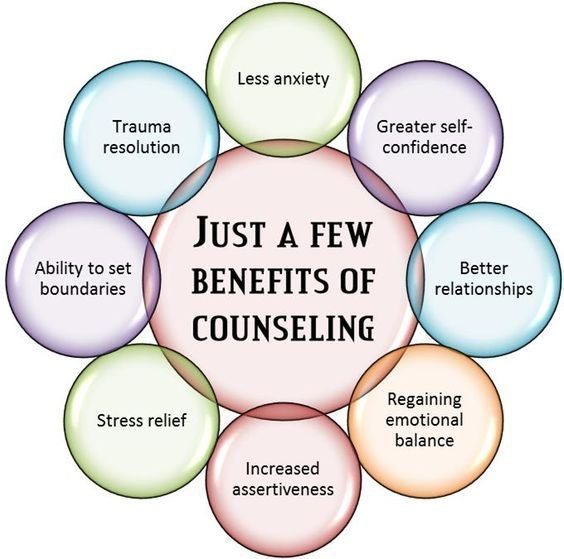Alcohol counselling is individual or group talking sessions to help you recover and get to the bottom of the emotional aspects causing you to drink.
Once you’re able to get to the bottom of these emotions, you can then begin the process of figuring out what your triggers are. Depending on the severity of your addiction, an alcohol therapy plan will be designed for you and feature varying counselling methods, including cognitive and behavioural therapy.
When searching for the right drug and alcohol counsellor, it should be noted that they can be accessed no matter what type of program you’re in.
During treatment at a rehab centre, you’ll meet other addicts who have found themselves in the same situations that you’ve been in. This is helpful because it helps to shine a light on the fact that you’re not the only one that has gone through this.
Different levels of care during rehab can include inpatient or outpatient, medically assisted therapies, counselling sessions, substance support group therapy, and other types of treatment. Some factors of a comprehensive treatment plan, like rehab and medically assisted therapies, can be completed over a few months. Other parts, such as counselling sessions and support groups, are essential during and after treatment to strengthen your rehabilitation plan and sustain your sobriety.
You might be wondering what an alcohol therapist does in their role as your counsellor. What they do well is listen to you when you’re telling them about your experiences.
When they’ve listened to what you say, they will help you determine some factors that led you to your addiction.
Another aspect of their job is to help you create a plan. This plan will help you know your triggers and what you can do when you’re in a situation where your motivation is present.
They also help you create a plan that will help you remain focused on your sobriety once you’ve left treatment. Therapists are there to provide you with motivation and encouragement.

The purpose of counselling in treating an addiction problem is primarily to help you understand why you drink/drink to excess. This can only safely be explored comprehensively with a sober and relatively stable individual.
If you are still drinking or taking drugs, drug & alcohol counsellors will focus on how to support you in stopping. Exploring deeper core issues while still drinking heavily can become a safeguarding issue.
A good counsellor will not do or say anything that they feel may make your drinking worse than it already is. They will only be able to offer support, light therapy and a safe space for you to talk; for some individuals with a mild to moderate drinking problem, this can prove to be enough.
Finding the right alcohol counsellor, the one you feel comfortable with, the one that can help you overcome blocks to your personal growth and the one that can help you maintain sobriety, isn’t always easy.
This is where we can help; we have a vast number of highly experienced and fully accredited registered alcohol counsellors based all over the UK. We can find you the perfect alcohol counsellor near you and take care of all the necessary arrangements.
We will conduct a free-of-charge triage assessment over the telephone to match you with a counsellor who can meet your individual treatment needs. With our help, there will be no waiting list, and you can rest assured that you are safe. By the same token, if we feel that alcohol counselling is not the most beneficial way forward for overcoming alcoholism, we will advise you of more appropriate treatment options.
Before entering a specific treatment facility, you’ll want to know what type of addictions they treat. You should continue searching for a suitable treatment facility if they don’t treat your addiction.
When you find a treatment facility that treats your type of addiction, you can ensure that you’ll get to interact with other recovering addicts that understand what you’re going through.
Depending on your insurance type, you could have a portion of your treatment plan paid for. When searching for the right treatment centre, ask beforehand what types of insurance they accept to attend their treatment programs.
Once you’ve been told that they accept your insurance, the next step is to contact your insurance provider. Your insurance provider will then be able to tell you what portion of your treatment will be covered by them and what part you’ll take care of.
You’ll want to inquire about the types of therapy they offer. If you’ve got underlying issues, you’ll want a treatment centre providing dual-diagnosis therapy.
These types of therapies can be discussed when creating the treatment plan you’ll be using throughout your time in the program. And it can also be tweaked to ensure that it’s a completely personalized treatment plan for you.

Another factor to consider when getting help is your alcohol usage. How much are you drinking every day? Are you drinking every day?
Are you a social drinker? Knowing how much you’re drinking is crucial when it comes to your treatment because it might help identify why you’re choosing to drink often.
Some treatment centres steer clear of medical therapies and, instead, go straight to more holistic therapies. This might include having you participate in some form of daily exercise.
Daily exercise helps relieve stress and tension you might be holding inside. Exercise is also an excellent way to eliminate the anger you might be feeling. Acupuncture is also a form of holistic therapy in which you might find yourself participating.
As you go through your session, the therapist will explain how acupuncture helps to depend on the part of the body that the acupuncture needles are being put into.
Cognitive therapy is the most common therapy you will receive in addiction treatment. CBT is designed to identify patterns that could prove to be destructive.
Once these patterns have been identified, you will begin finding ways to halt these destructive patterns. Once you realize that the emotions you feel can directly influence your cognitive patterns, you’ll be better off.
While cognitive therapy is helpful, it can be overwhelming and frustrating. The entire process takes time, but the outcome is rewarding for those going through it.
Often, when people undergo counselling for an addiction, they find that they have more issues than just addiction. Some addicts suffer from underlying mental disorders, including bipolar disorder or schizophrenia.
The symptoms of these mental diseases might be covered up when people continually drink or indulge in other substances. Once you’ve removed the meaning, you can begin to note the underlying issues.
Not to mention, once it’s known what other mental issues you have, you can begin finding ways to manage this. Whether taking medications or figuring out long-term treatment to assist with this.
Alcoholism is a chronic and progressive brain disorder, and alcohol is often a solution to the individual’s emotional pain and suffering. To successfully treat the psychological aspect of addiction, the individual must be sober to benefit from alcohol counselling sessions fully.
Alcohol clouds the brain and affects your judgement, decision making and perception. Excessive alcohol use also chemically damages the brain, so even if you can be sober for counselling sessions if you drink heavily in between, the alcohol will still negatively affect your ability to think clearly.
Drinking counselling can support a person in getting sober but is most helpful after a detox, rehab programme or a period of continued sobriety.
For those who are sober and in recovery from alcohol addiction or a past problem with alcoholism, a good alcohol counsellor can help in the following ways:
A good drug or alcohol counsellor can help you understand your addiction and how it manifests in you. They can also help you adapt to life as a sober person and teach you methods to help keep your recovery safe and grow in your emotional sobriety.
Regarding alcohol addiction counselling, everything we’ve included in this guide will be helpful in your journey down the recovery road. Understanding the types of counselling that you’ll receive is the first step to getting your life back.
Consider the environment you live in before you attempt therapy. For some people, their habitat isn’t tremendous and breeds addiction. Some studies have been done showing a link between addiction and genetics.
While the studies that have been done aren’t yet conclusive, there is significant evidence that shows, in some cases, genetics does play some role in your ability to become addicted to a substance.
Also, will your medical history affect your therapy? How many times have you gotten alcohol poisoning? How often have you been to the emergency room? Do you have kidney and liver issues? Knowing your medical history will give the treatment program you enter the information they need to ensure you’re getting proper treatment.
And it will help them understand the damage that has been inflicted on your body as a result of prolonged alcohol use. Now that you’ve got a better understanding of what factors can influence the type of therapy you receive, it’s time to look closer into the varying types of treatment.
If you’re unsure about the treatment centre you want to enter, contact us here at the Rehab Guide. Not only do we cover alcohol addiction, but we also provide programs for various other addictions.
We want to help you get back to the life you once had, where you were free of addiction and living healthier than ever imagined. When was the last time you could smile without a cloud in sight?
We want to help you achieve sunnier days. If you require more alcohol cessation advice, contact our experienced addiction advisors for free help and advice.
Try our – Am I an Alcoholic? Self-Assessment Questionaire to help you identify if the amount you drink could be putting your health at serious risk
Sources:
https://www.webmd.com/mental-health/addiction/counseling-and-addiction-how-therapy-can-help#1
Mind.org
Treatment Therapies for Dual Diagnosis – dualdiagnosis.org